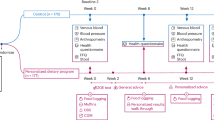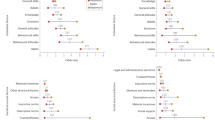Abstract
OBJECTIVE: The present study was aimed at verifying the hypothesis that individuals belonging to different classes of BMI could show diversities in attitudes and beliefs toward the consumption of food containing fat within the Fishbein and Ajzen framework.
SUBJECTS AND METHODS: Nine hundred and seventy-five families out of 1200 participated in a study aimed at assessing attitudes towards the consumption of foods containing fats. Only subjects over 17 years of age with BMI values over 18.5 kg/m2 were included in the present study. The recruited families were asked to record their food consumption for 7 days according to a mixed technique including the weighed inventory method and the individual daily record of food consumption. Each individual also completed a questionnaire containing questions on belief, attitude and intention items based on Ajzen and Fishbein’s model. All questions were related to the consumption of eight foods containing fats.
RESULTS: The main finding was an absence of differences in attitudes and beliefs towards foods containing fats between the two groups of normal weight and overweight subjects, obtained by the regression analysis. The subjective measure of habit outweighed attitude in the impact on intention of consuming. Evidence of something to be further investigated comes from the first Principal Component that showed the cognitive ‘Beliefs on gaining weight and getting fat’ was the best summary of information in relation to the choice of red meat for the group of normal weight subjects, whereas the same belief was the best summary of information in relation to the choice of butter and cheese for the group of overweight subjects.
CONCLUSION: Attitudes and beliefs play a similar role in the choice of foods containing fats in the two groups of people considered. Habit was found to be an important predictor of behaviour for both the two groups of subjects. With attempts to modify diet, habit may serve as a barrier to change. Thus, elucidating the roles played by these variables is crucial to developing effective future intervention strategies. However, the slight difference found in the cognitive belief on gaining weight and getting fat for red meat, butter and cheese suggests that further investigations on opinions about the role of certain foods will be useful.
This is a preview of subscription content, access via your institution
Access options
Subscribe to this journal
Receive 12 print issues and online access
$259.00 per year
only $21.58 per issue
Buy this article
- Purchase on Springer Link
- Instant access to full article PDF
Prices may be subject to local taxes which are calculated during checkout
Similar content being viewed by others

Author information
Authors and Affiliations
Corresponding author
Rights and permissions
About this article
Cite this article
Saba, A., Turrini, A., Di Natale, R. et al. Attitudes towards food containing fats in subjects of different body size. Int J Obes 23, 1160–1169 (1999). https://doi.org/10.1038/sj.ijo.0801047
Received:
Revised:
Accepted:
Published:
Issue Date:
DOI: https://doi.org/10.1038/sj.ijo.0801047


